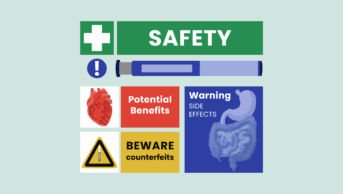
Shutterstock.com
Patients in hospital emergency departments (EDs) who are able to self-administer time-critical medicines (TCMs) should be supported to do so, the Royal College of Emergency Medicine (RCEM) has said.
An advisory statement, published in March 2025 and co-created with the UK Clinical Pharmacy Association (UKCPA) and the Association of Ambulance Chief Executives, said that many patients who attend EDs across the UK “are not given their TCM when they need them with doses being delayed or being missed completely”.
“EDs should support those patients who are able to self-administer their own time-critical medications to do so,” the statement said.
“Departments must ensure that self-administration of time-critical medications is subject to the same standards of monitoring and governance oversight as non self-administered medication.”
TCMs — which include insulin for diabetes and anticonvulsants for epilepsy — are those where a “delayed or missed dose can result in harm with exacerbation of symptoms and the development of complications leading to an increased mortality if it continues,” the statement added.
The advisory statement lists four principles that should be met to allow for self-administration to happen safely.
These principles include patient assessment by ED staff — to ensure they are suitable for self-administration — and written or electronic monitoring of an occasion where medicines were self-administered.
However, the statement acknowledges that not all patients have the ability or mental capacity to self-administer — either because of, for example, dependency on carers or owing to acute illness or injury.
The RCEM’s 2023–2026 national quality improvement programme (QIP) for TCMs focuses on a different range of medicines each year.
Kunal Gohil, specialist clinical pharmacist at Nottingham University Hospitals NHS Trust, UKCPA emergency care committee education lead and co-author of the statement, said: “Pharmacists are the gatekeepers to medications in healthcare settings and are essential to providing safe and effective use of medications.
“EDs are known to be one of the highest risk areas for medicines management in any healthcare setting, given the acuity of patient profiles and often the limited clinical information available early in treatment cycles.”
Gohil added: “Governance, documentation and clinical risk management, particularly around self-administration and time-critical medications, is complex, for a variety of reasons — and pharmacists in the ED will be integral in adapting the advisory statement into local guidelines and pathways to improve patient care and empower patients.
“[Pharmacists] will also be pivotal in systems around reconciliation and supply of time-critical medications for patients who are not be able to self manage their medications in the ED.”
Adrian Boyle, president of the RCEM, said the position statement “provides clear and practical guidance for our members within the ED and in pre-hospital settings, as well as allowing for patient autonomy, and I thank our partners for their work and support”.
“TCMs are exactly what they say, and it is vital that patients are able to access their doses on time every time. It is sensible and pragmatic that if a patient has the capacity and ability to manage their own medication, they should be able to — with clinicians assisting if they do not,” he added.
“As our patients experience increasingly long stays within EDs, it is crucial that people don’t miss doses while they are waiting.”
An RCEM QIP interim report on TCMs, published on 7 April 2025, analysed data from 136 EDs and found that from October 2023 to October 2024, more than half (53.4%) of eligible patients taking TCMs were not identified within 30 minutes of arriving at an ED.
It also found that over two-thirds (68%) of eligible patients’ doses were not administered within 30 minutes of the expected time.
The report, which was supported by Parkinson’s UK and Diabetes UK, said that EDs “must have a clear governance structure in place to determine who is responsible for the prescribing and administering of TCMs in the ED from when the patient arrives, to when they are admitted to the ward or discharged from the ED”.
It also said that EDs should “ensure they are working towards previous RCEM recommendations regarding embedding clinical pharmacy services to support timely access to time-critical medications”.
Helen O’Kelly, assistant director of services, communities and improvement at Diabetes UK, said: “It is encouraging to see that, in the first year of the QIP, there has been a positive shift in improvements. We look forward to seeing the results as the programme continues.”
In December 2024, the Health Services Safety Investigations Body said that hospitals should review the pharmacy support available in EDs.
The recommendation followed the death of a patient with Parkinson’s disease who, after admission to an ED, missed 7 out of 18 doses of a time-critical Parkinson’s medicine and three doses were administered late.


